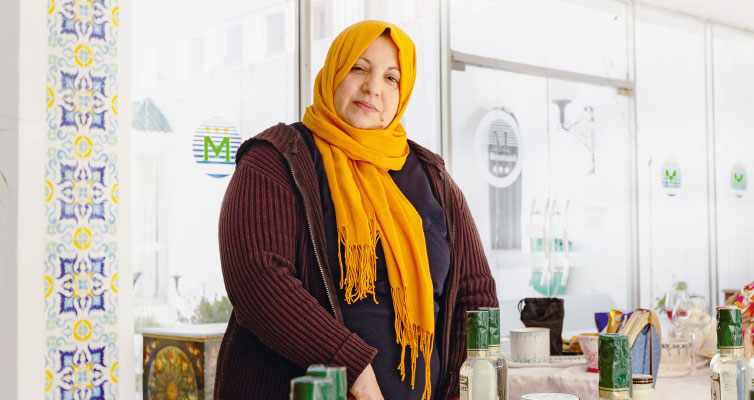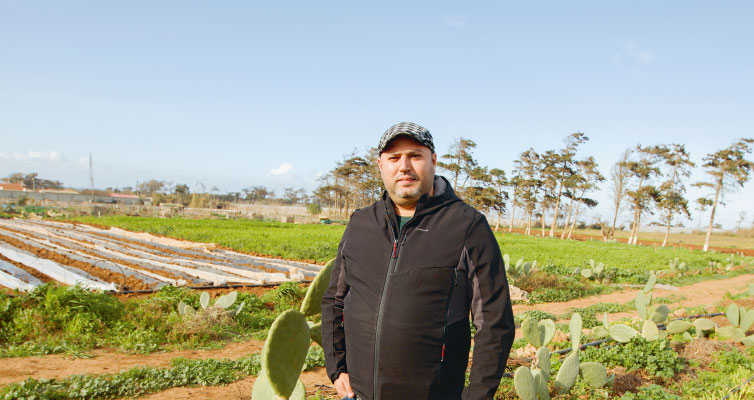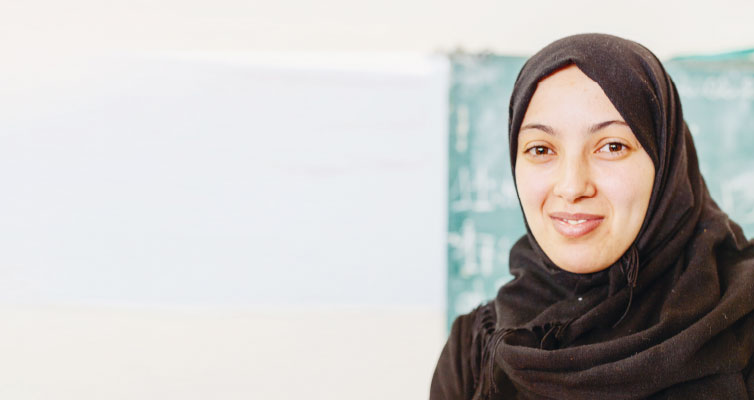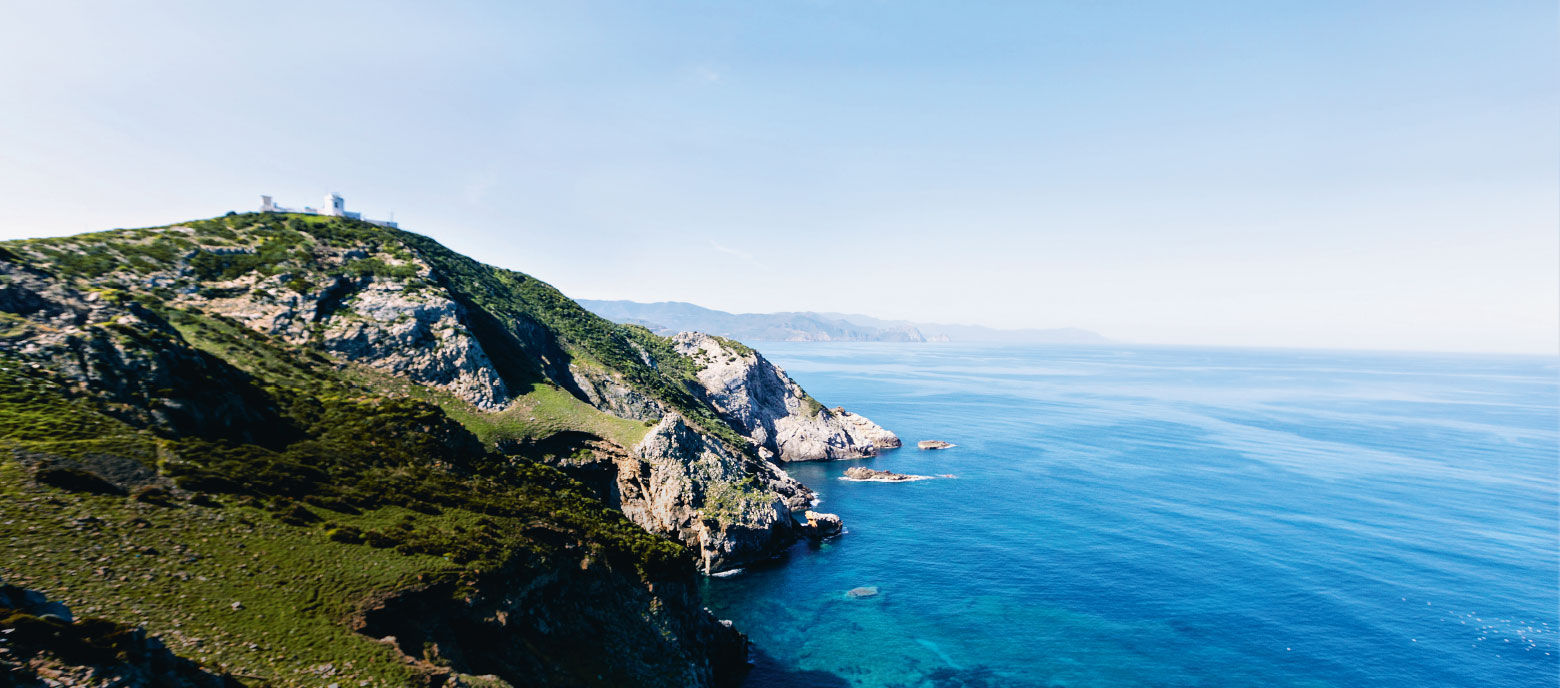Perspectives
Custodians of natural treasures
‘We learned how to protect nature, harvest crops sustainably and market the products.’

‘I used to just stay at home all the time, taking care of my family and the household. Nobody was interested in us rural women. Life was very limited. When I saw women going to work, I started to ask myself why I couldn’t do that as well. Eventually, the project presented me with a unique opportunity. The people from GIZ came to our community, explained what it was all about and asked whether I would like to join in. With their help we learned how to protect nature, grow and harvest crops sustainably, run a cooperative and market the products. We simply weren’t aware of the fantastic resources out there in our forests. Now we make essential oils out of wild pistachios, rosemary, laurel and eucalyptus.
We produce aromatic waters, soaps and skin creams. Our income makes us financially independent and we don’t have to ask our husbands for money all the time. This gives us a completely different social status. In the early days people would talk, asking why my husband let me be out of the house all day and travel to other places. However, he and my family began to trust me more and more and actually encouraged me to do this work. In the end, we even had trips to trade fairs in Tunisia and Germany. Now I’m responsible for the house, my work and the women in the cooperative. I have to be there for them and motivate them, as well as dealing with marketing. We want our products to be the best, and sell them in this country and abroad. Yes, we do have dreams. If a woman has help and support, she can do good things for herself and others. If you see women that way, you feel that you have a goal in life.’
‘Cooperatives are the driver of Algeria’s agriculture sector.’

‘The zeal of the rural women inspired me – and the thought that I could do something for the development of these neglected, impoverished regions. That motivated me tremendously to be a link in this chain. I strongly believe that cooperatives are the driver of the agriculture sector. That’s why I supported the cooperatives with my expertise and technical equipment, for example a distiller. I also entered into a fair trade agreement with them, the very first of its kind in Algeria. Cooperating with them in this way is very advantageous for me economically. I’m well aware of the high value of their products and am willing to pay a suitably high price for that high quality.
Another reason why I thought the project a good idea from the outset was that it has a certain underlying ethical spirit. That’s something that was always my aim: ethics at work. I feel very strongly about preserving anything that is rare and endemic, and giving it the value it deserves. The women harvest what they need with care and a lot of love. They know they are touching the soul of the plants. This is why I present their products for sale as the most exclusive in my entire range and enclose a brief outline of their story. This type of “storytelling” increases their worth even more, and above all speaks to those among my customers who value an ethically sound product. And, not to forget, I’m doing my bit to help improve living standards for these women.’
‘I took part in all the courses.’

‘I actually trained as a construction engineer at a technical school, but I never earned any money in that profession because there aren’t any jobs. So the cooperative gave me a good opportunity to start working. The GIZ team spoke to women directly in our region here. At first I thought, well, it’s better than nothing. But I’ve been involved for two years now and I’ve grown to really like the work. I’ve taken part in all the courses on medicinal plants, sustainable development, marketing, finance and management. When GIZ provided us with a distiller to broaden our product range, I decided to specialise in distilling. The other women are a little older and were wary of touching the equipment. They were frightened that it might explode. To be honest, at first I was scared too that it would all blow up in my face, but now I really enjoy it.
It isn’t that complicated at all. We used to just dry plants. Now we produce essential oils and aromatic waters and have extended our range to include soaps and creams. It would be good if we could grow the plants ourselves in greenhouses, too. Then we wouldn’t have to spend so much on transport. Up to now, we’ve had to hire a vehicle to drive into the mountains. If we grew our own, we could increase yields and reduce costs. Not only that – we want to get our products certified so that we can sell them to pharmacies as well. That will add to our profits, and we can invest more in materials such as hoses, pumps, packaging or labels. I think our cooperative really does have a future. We just need to keep working hard.’
WOMEN’S COOPERATIVES
SHOW THE WAYIndigenous plants and fruits have long been used in traditional medicine and cosmetics in Algeria. In the north-eastern coastal regions of El Kala and the Edough Massif, local women who are the custodians of this knowledge have used it to devise a business model. At the initiative of GIZ, they came together in 2018 to form the country’s first women’s private cooperatives. On behalf of BMZ, GIZ supported them with expertise and materials. There are now 95 women organised in five of these cooperatives. They used to work on their own, or not at all. Now they all work together, using the operational and marketing structures that they have created. They form networks, attend management courses and take part in national and international trade fairs. In this way, they learn to increase production efficiency and broaden their product range. The transformation from housewife to entrepreneur has fundamentally changed their position within society, which is rural and very conservative. The women are part of the local population of two national parks, one existing and one planned, and are involved in drawing up the usage plans for them. This is intended to guarantee the women a long-term source of income and prevent the overexploitation of resources. As a result, the state gains partners who strengthen rural economic structures and the biodiversity conservation projects at the same time.
Contact: Rolf Dietmar, rolf.dietmar@giz.de
The project contributes to the following United Nations Sustainable Development Goals (SDGs):
|
|
|
|
|
|
akzente 2/21
